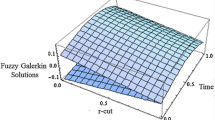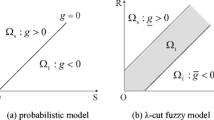Abstract
A new numerical technique named as fuzzy finite difference method is proposed to solve the heat conduction problems with fuzzy uncertainties in both the physical parameters and initial/boundary conditions. In virtue of the level-cut method, the difference discrete equations with fuzzy parameters are equivalently transformed into groups of interval equations. New stability analysis theory suited to fuzzy difference schemes is developed. Based on the parameter perturbationmethod, the interval ranges of the uncertain temperature field can be approximately predicted. Subsequently, fuzzy solutions to the original difference equations are obtained by the fuzzy resolution theorem. Two numerical examples are given to demonstrate the feasibility and efficiency of the presented method for solving both steady-state and transient heat conduction problems.
Similar content being viewed by others
References
Efe, M.O., Ozbay, H.: Multi input dynamical modeling of heat flow with uncertain diffusivity parameter. Math. Comp. Model Dyn. 9, 437–450 (2003)
Nicolai, B.M., Egea, J.A., Scheerlinck, N.: Fuzzy finite element analysis of heat conduction problems with uncertain parameters. Int. J. Food Eng. 103, 38–46 (2011)
Lu, Q.: Some results on the controllability of forward stochastic heat equations with control on the drift. J. Funct Anal. 260, 832–851 (2011)
Moens, D., Vandepitte, D.: Recent advances in nonprobabilistic approaches for non-deterministic dynamic finite element analysis. Arch. Comput. Methods Eng. 13, 389–464 (2006)
Stefanou, G.: The stochastic finite element method: Past, present and future. Comput. Methods Appl. Mech. Eng. 198, 1031–1051 (2009)
Gao, W., Zhang, N.: A new method for random vibration analysis of stochastic truss structures. Finite Elem. Anal. Des. 45, 190–199 (2009)
Kaminski, M.: A generalized stochastic perturbation technique for plasticity problems. Comput. Mech. 45, 349–361 (2010)
Pereira, S.C., Mello, U.T.: Uncertainty in thermal basin modeling: An interval finite element approach. Reliable Comput. 12, 451–470 (2006)
Haim, Y.B., Elishakoff, I.: Convex Models of Uncertainty in Applied Mechanics. Elsevier, Amsterdam (1990)
Wang, Y.G., Wei, G.: Dynamical systems over the space of upper semicontinuous fuzzy sets. Fuzzy Set. Syst. 209, 89–103 (2012)
Zadeh, L.A.: Fuzzy sets. Inf. Control. 8, 338–353 (1965)
Hanss, M., Turrin, S.: A fuzzy-based approach to comprehensive modeling and analysis of systems with epistemic uncertainties. Struct. Saf. 32, 433–441 (2010)
Balu, A.S., Rao, B.N.: High dimensional model representation based formulations for fuzzy finite element analysis of structures. Finite Elem. Anal. Des. 50, 217–230 (2012)
Farkas, L., Moens, D.: Fuzzy finite element analysis based on reanalysis technique. Struct. Saf. 32, 442–448 (2010)
Hien, T.D., Kleiber, M.: Stochastic finite element modeling in linear transient heat transfer. Comput. Methods Appl. Mech. Eng. 144, 111–124 (1997)
Kaminski, M., Hien, T.D.: Stochastic finite element modeling of transient heat transfer in layered composites. Int. J. Heat Mass Tran. 26, 801–810 (1999)
Emery, A.F.: Solving stochastic heat transfer problems. Eng. Anal. Bound Elem. 28, 279–291 (2004)
Xiu, D.B.: A new stochastic approach to transient heat conduction modeling with uncertainty. Int. J. Heat Mass Tran. 46, 4681–4693 (2003)
Wang, H., Dai, W.: A finite difference method for studying thermal deformation in a double-layered thin film exposed to ultrashort pulsed lasers. Int. J. Therm. Sci. 45, 1179–1196 (2006)
Smith, G.D.: Numerical Solutions of Partial Differential Equations (Finite Difference Methods), (3rd edn.). Clarendon Press, Oxford (1985)
Tao, W.Q.: Numerical Heat Transfer, (2nd edn.). Xi’an Jiaotong University Press, Xi’an (2009)
Huang, H.Z., Li, H.B.: Perturbation finite element method of structural analysis under fuzzy environments. Eng. Appl. Artif. Intel. 18, 83–91 (2005)
Erdolen, A.: Interval finite element analysis of truss systems. Tek. Dergi. 22, 5305–5318 (2011)
Author information
Authors and Affiliations
Corresponding author
Additional information
The project was supported by the National Special Fund for Major Research Instrument Development (2011YQ140145), 111 Project (B07009), the National Natural Science Foundation of China (11002013), and Defense Industrial Technology Development Program (A2120110001 and B2120110011).
Rights and permissions
About this article
Cite this article
Wang, C., Qiu, ZP. Fuzzy finite difference method for heat conduction analysis with uncertain parameters. Acta Mech Sin 30, 383–390 (2014). https://doi.org/10.1007/s10409-014-0036-7
Received:
Revised:
Accepted:
Published:
Issue Date:
DOI: https://doi.org/10.1007/s10409-014-0036-7




